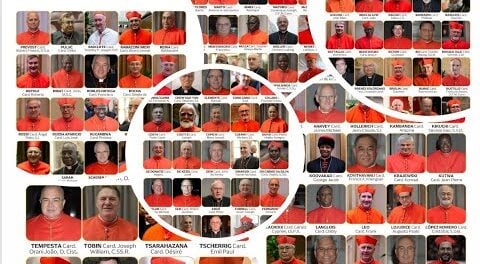When the Pope used the term ‘Angel of the Apocalypse’ in the Middle Ages, people knew he was talking about St. Vincent Ferrer
St. Vincent Ferrer earned the title preaching the Gospel powerfully and persuasively, often on the Final Judgment and the coming of the Antichrist. Even Pius II’s Bull of Canonization called St. Vincent Ferrer “the Angel of the Apocalypse, flying through the heavens to announce the day of the Last Judgment, to evangelize the inhabitants of the earth.”
This year marks the 600th anniversary of St. Vincent Ferrer’s death on April 5, 1419, yet his words remain as powerful and necessary as ever. Before looking at his preaching on the Last Judgment, the Antichrist and the End of the World, let’s understand how powerful a preacher he was all over Europe, beginning in his native Spain, by looking at a mere speck of who he reached and the miracles he performed.
As a Dominican priest, Vincent Ferrer preached in his own native language or Latin, yet wherever he went, everyone miraculously understood his every word as if he were preaching in their language. Sinners by the thousands, even the most hardened, repented. When the curious Moorish king sent for him, after Vincent Ferrer gave just three sermons, 8,000 Moors converted and wanted to be baptized. Modest estimates put his conversion of Jews in city after city in Spain at 25,000.
At one major church conference, Vincent’s preaching saw 14 of 16 rabbis converted on the spot. In Toledo as Jews became Christians they turned their synagogue into a church under the Blessed Mother.
Like Jesus raising the widow of Naim’s son, thorough the power of Christ St. Vincent stopped a funeral procession and commanded the corpse to rise, restoring the dead man to life. In all, he restored 28 dead people back to life. Even after he died, two dead people placed on his tomb came back to life.
He cured countless physical infirmities, working wonders through the name of Jesus and the Sign of the Cross. In one, he restored the use of the limbs of an incurably crippled boy who eventually became the Bishop of Barcelona.
In confession, he could read souls. He shared heavenly previews of future events, such as telling a mother her little son would become pope and canonize him — which happened as the boy became Callixtus III. (At the canonization Vincent Ferrer’s body was found incorrupt.) Earlier, during a Barcelona famine, he announced two ships were coming loaded with corn. Nobody believed. That same day, as predicted, the ships arrived.
Highly devoted to the Blessed Mother, he preached and demonstrated the power of the Rosary through immediate conversion obtained through praying it.
Preaching the Last Judgement
Jesus will come not like his first coming in humility and poverty, but “in such majesty and power that the whole world will tremble,” began Angel of the Apocalypse in a sermon. When he powerfully detailed the glory and the horror of separating the sheep and goats described in Matthew 25, record has it sinners were frightened and cried. He wanted them to do so because he himself was fearful of that day and fearful for all those he preached to.
Vincent told the throngs:
People will say ‘to the mountains and the rocks: Fall upon us, and hide us from the face of him who sits upon the throne, and from the wrath of the Lamb’ (Revelation 6:16). Yet Jesus said, ‘But when these things begin to come to pass, look up, and lift up your heads,’ ‘because your redemption is at hand’ (Luke 21:28).The Blessed Mother shall sit with him. Jesus will separate the peoples of the nations as a shepherd separates sheep from goats.
St. Vincent cautioned, “On that day it will be better to be a sheep of Jesus Christ that to have been a pope, or king, or emperor.”
Vincent powerfully detailed five virtues revealed in Scripture that distinguishes the sheep: “simple innocence, ample mercy, steadfast patience, true obedience, and worthy penance.”
First, simple innocence is when a person “lives simply, nor hurts anyone in his heart, by hating, nor by defaming in speech, nor striking with hands, nor by stealing. Such a life “is called simple innocence, which makes a man a sheep of Christ.”
In each case, St. Vincent next colorfully details reasons why. A sheep doesn’t attack with horns like a bull…
…nor bite with its teeth like a wolf, nor strike with hooves like a horse… if you wish to be a sheep of Christ, you should strike no one with horns of knowledge or of power, for lawyers strike by the horns of knowledge, jurists, advocates, or men who have great knowledge. Merchants by deceiving others. Lords and bullies strike with the horns of power, plundering or injuring, and extorting, using calumnies and threats, and the like. Listen to what the Lord says by the mouth of David: ‘And I will break all the horns of sinners: but the horns of the just shall be exalted’ (Psalm 74:11).
“Biting” is to defame your neighbor’s reputation, and devour by saying “nothing good praising someone, but only the bad,” so “defamers are not the sheep of Christ, but wolves of hell.”
Kicking like horses means to despise. Therefore, he warns, “children, do not hate your parents; nor parents, children; nor young people, old folks; nor the healthy, the sick; nor rich, the poor; nor masters, their servants; nor prelates, their clergy; and vice versa. It is clear what is simple innocence.”
Second, ample mercy means distributing your God-given temporal and spiritual gifts to the needy. “Because,” Vincent illustrates, “among all the animals a sheep is the most beneficial of animals. For the sheep by growing wool, shows us mercy and benefits of mercy, because how many poor people does a sheep clothe?” Sheep give milk and food to eat to. We imitate and give love this way: our wool is “external and temporal goods, bread and wine, money and clothes and the like.” The milk is “interior and spiritual goods, by giving good teaching to the ignorant… If you have the milk of knowledge, of devotion, or of eloquence, you should give to those not having them.” Vincent reminds of Jesus telling the sheep, “For I was hungry, and you gave me to eat; I was thirsty, and you gave me to drink… naked, and you covered me” (Matthew 25:35-36).
Third, steadfast patience takes different forms, such as when someone “suffering from injuries inflicted or spoken to him does not want to concern himself with taking revenge. Rather he loves everyone in general, and prays for them all.” The analogy? The “sheep is a most patient animal, for if harassed while eating, or if struck, it does not defend itself, but goes elsewhere, nor does it avenge itself like a dog or a goat would do, but humbly yields. O blessed is the person, man or woman, who has such patience, and takes no vengeance for injuries, but forgives, as God forgives him.”
Fourth, true obedience means ordering all thoughts, words and actions according to God’s will, not ours, just as sheep are so obedient that a child with a staff easily “can easily guide 30 or 40 sheep.” Remember Psalm 23? Remember Jesus illustrating the shepherd was able to leave 99 safely alone as he searched for the lost sheep?
Vincent Ferrer’s simple summary for the shepherd’s commands includes these: “First that we live humbly” because Jesus said “learn of me, because I am meek, and humble of heart” (Matthew 11:29). Those with pride aren’t Christ’s sheep but the devil’s goat. Second, give with mercy and generosity. Who “disobediently goes by the way of avarice by committing usury, robbery, theft, etc., is not a sheep of Christ, but a goat of the devil.” Next, we must “walk by the way of cleanness, of chastity, etc.” Matthew 19:12). “Whoever therefore goes by the way of uncleanness and the filthiness of lust and carnality, such is not a sheep of Christ but a goat of the devil.”






Leave a Reply